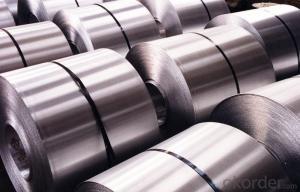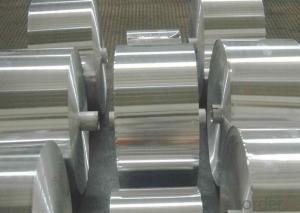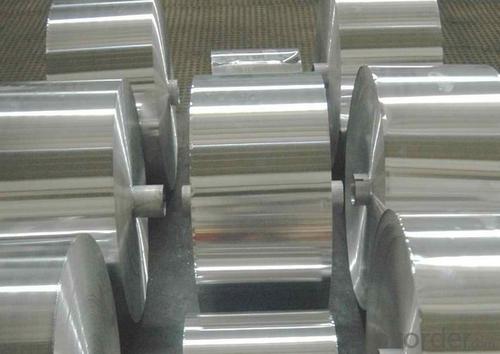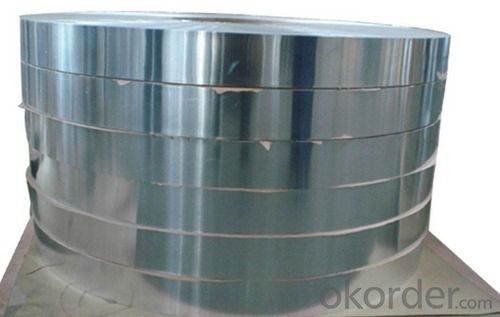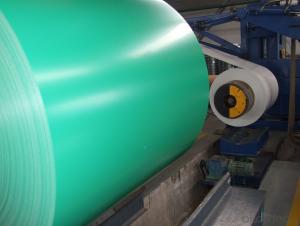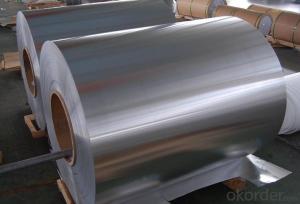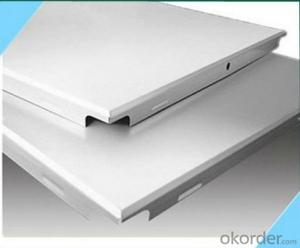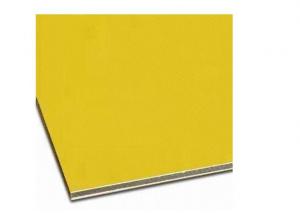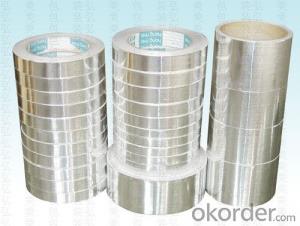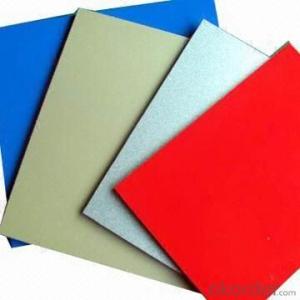Anodized Aluminum Coil for ACP (Aluminum Composite Panel)
- Loading Port:
- Shanghai
- Payment Terms:
- TT OR LC
- Min Order Qty:
- 1 m.t.
- Supply Capability:
- 2000 m.t./month
OKorder Service Pledge
OKorder Financial Service
You Might Also Like
Specification
Product Description:
The heat treatable alloys of 2000, 6000 and 7000 are such that when subjected to thermal temperatures, they again pronounced strengthening. Hence, tempers are indicated by "T". These alloys are also inventoried in clad form to increase corrosion resistance. All of the aluminum alloys are available in the annealed condition or commonly referred to as "O".
Aerospace - 2024, 6013, 6061, 7075
Construction - 3003, 5052, 6061
Electrical and Chemical Applications - 1100
General Machining Applications - 3003, 5052
Thickness from 0.18mm to more than 200mm are available for your needs. Aluminum can process to your special requirements and support traceability with complete Mill Test Certificate(MTC) and the essential industry specifications. More details about Aluminum sheet coil for Beverage Cans, Food Cans & Closures as following
Aluminum coil for aluminum composite panel
Always present in the development of aluminum coil for the Beverage Cans Making Industry, LingFeng offers Aluminum Coils for Beverage Can Body Stock, Coated End Stock and Bare or Coated Tab Stock. Lingfeng rolling facilities include: Modern equipment that guarantees high efficiency in the can makers lines and possible light-weight. A state-of-the-art lacquering line suitable for the coating of easy open end and tabe. PVC-free, BADGE-free and Solvent-free (free-based) lacquering systems are applied.
Being able to produce according to detailed customer requirements, Lingfeng can provide tailor-made solutions.
Aluminum sheet coil for Food Cans
New lacquerng line is suitable for the coating of bodies, lids and tabs of rectangular or round Food Cans for aggressive food or fruit-juice products. BADGE-free and Solvent-free (water-based) lacquering systems are applied. The material can also be supplied degreased, chromium phosphated and DOS treated.
Aluminum sheet coil for Closures
Committed to continuous development and full customer satisfaction, Lingfeng offers Pre-treated and Pre-coated Coils or Straight-cut Sheets for the production of Pilfer-proof Caps. Lingfeng provides high quality non-earing material, suitable for both one and two step Drawn Caps. Rolling experience and new lacquering facilities ensure excellent service in terms of products range and J. I. T deliveries providing Closures in three different aluminum alloys and two alternative finishes, bare or coated. Lingfeng material is used for the production of Pilfer Caps for carbonated and non-carbonated beverages, alcoholic or non-alcoholic drinks and as closures for pharmaceutical products.
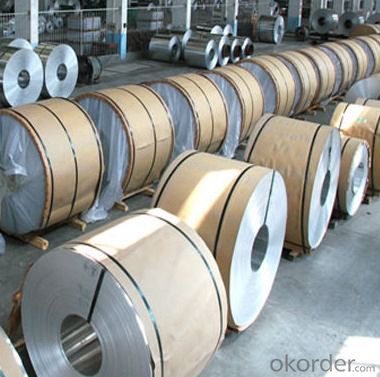
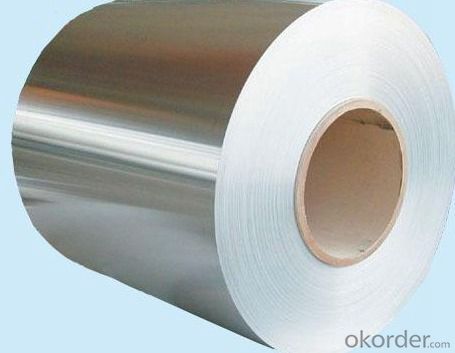
Aluminium Coil PPGL Specification:
Quality Certification
According to EN and GB/T standards or as per agreed customer specifications.
Aluminum Coil for Beverage Cans, Food Cans and Closures Specifications
| Production Range (mm) | |||||
| Aluminum Sheets/Coils for Food Cans | Aluminum Sheets/Coils for Food Cans | ||||
| Thickness | Width | Thickness | Width | Length | |
| Body | 0.250 min. | 2300 max. | 0.18-0.25 | 500-1020 | 1045 max. |
| End | 0.222 min. | 2300 max. | 0.20-0.30 | 100-1020 | 1045 max. |
| Tab | 0.235 min. | 45 min. | 45 min | 29 min. | Coils only |
| Production Range (mm) | ||||
| Beverage Cans- Dimension | Food Cans-Coil Dimensions | |||
| Inside Diameter | Outside Diameter | Inside Diameter | Outside Diameter | |
| Body | 400 or 500 | 1850 max. | 400 or 500 | 1800 max. |
| End | 400 or 500 | 1850 max. | 300 or 400 or 500 | 1800 max. |
| Tab | 400 | 1850 max. | 300 or 500 | 1800 max. |
| Closures-Dimension Range | |
| Thickness | 0.20-0.3 |
| Width | 500-1020 |
| Length(Sheet) | 1045 max. |
| Inside Diameter | 300 or 400 or 500 on carton core |
| Outside Diameter | 1800 max |
| Finishes-Treatment | |||
| Beverage | Food | Closures | |
| Body: | Pre-lubricated: According to customer requirement. | Degreased, Chromium phosphate converted and DOS treated. | Pre-treated: Degreased, Chromium phosphate converted and if requested DOS treated. |
| End: | Pre-coated & Pre-maxed: According to customer requirements. | Pre-treated: Degreased, Chromium phosphate converted and DOS treated. Coated: Pre-waxed and lacquered on public or product side of the can, or both. | Coated: Lacquered on either or both sides. |
| Tab: | Coated: Clear or coloured expoxy, or bare: degreased and DOS re-oiled | Coated: Clear or coloured coated or bare: degreased and DOS re-oiled | |
FAQ of Aluminium Coil for ACP (Aluminum Composite Panel):
1.Superior quality of raw material.
2.Reasonable and stable chemical composition.
3.Accurate tolerance.
4.Goode mechanical property.
5.We have the certificate of ISO9001.
- Q: What are the steps to properly store an unused aluminum coil to prevent it from rusting?
- <p>To store an unused aluminum coil and prevent rusting, follow these steps: 1. Clean the coil thoroughly to remove any dirt or moisture. 2. Apply a thin layer of a rust inhibitor or light oil to the surface. 3. Wrap the coil in a protective plastic or wax paper to prevent moisture and air exposure. 4. Store the coil in a cool, dry place away from direct sunlight and humidity. 5. Ensure the storage area is well-ventilated to prevent condensation. 6. Periodically check the coil for any signs of rust and clean if necessary. By following these steps, you can effectively prevent rusting and maintain the quality of the aluminum coil.</p>
- Q: This question is asking for a comparison of various types of aluminum coils, highlighting their unique characteristics and uses.
- <p>Aluminum coils are differentiated by their thickness, alloy composition, surface treatment, and temper. Common types include 1000 series coils with high purity, 3000 series known for formability, 5000 series for corrosion resistance, and 6000 series for strength. Thickness varies from thin gauges used in packaging to thick ones for construction. Surface treatments can include anodizing, painting, or lacquering for enhanced properties. Temper refers to the hardness and strength, with 'H' for hard and 'O' for soft tempers. Each type serves specific industries, such as automotive, aerospace, construction, and packaging.</p>
- Q: What are the different color coating options for aluminum coils?
- There are various color coating options available for aluminum coils, depending on the specific requirements and preferences of the customer. Some common color coating options include: 1. Polyester (PE) Coating: This is one of the most popular coating options for aluminum coils. Polyester coatings provide excellent color retention, durability, and resistance to UV radiation, making them suitable for both indoor and outdoor applications. 2. Polyvinylidene Fluoride (PVDF) Coating: PVDF coatings offer superior weather resistance, chemical resistance, and color stability. They are highly durable and can withstand harsh environmental conditions, making them suitable for architectural applications. 3. High-Durability Polyester (HDP) Coating: HDP coatings are specifically formulated to provide enhanced durability and resistance to fading, chalking, and abrasion. They are commonly used in demanding applications where long-term color retention and performance are critical. 4. Silicone Modified Polyester (SMP) Coating: SMP coatings provide good weather resistance, flexibility, and color stability. They are often used in industrial and commercial applications that require a balance between performance and cost-effectiveness. 5. Polyurethane (PU) Coating: PU coatings offer excellent chemical resistance, flexibility, and adhesion properties. They are commonly used in applications that require resistance to chemicals, solvents, and harsh weather conditions. Additionally, various color options are available within each coating type, allowing customers to choose from a wide range of colors and finishes. Some manufacturers also offer custom color matching services to meet specific design requirements. It is important to note that the selection of the appropriate color coating option for aluminum coils should consider factors such as the intended use, environmental conditions, durability requirements, and aesthetic preferences. Consulting with a trusted supplier or coating specialist can help determine the most suitable color coating option for a specific application.
- Q: How are aluminum coils protected during shipping?
- Aluminum coils are protected during shipping through various methods to ensure their safety and prevent any damage. One common method is the use of protective packaging materials such as bubble wrap, foam, or corrugated cardboard. These materials are used to wrap the coils and create a cushioning effect, absorbing any impact or vibration that may occur during transportation. In addition to protective packaging materials, aluminum coils are often placed in sturdy shipping containers or crates. These containers are designed to provide extra security and stability during transit, minimizing the risk of the coils being jostled or bumped. Moreover, in some cases, aluminum coils are secured with strapping or banding to keep them in place and prevent shifting or movement during transportation. This helps to maintain the integrity of the coils and minimize the risk of damage caused by rubbing against other objects. Furthermore, shipping companies may also use air-bag systems or dunnage bags to fill any empty spaces within the shipping container. This further reduces movement and provides an additional layer of protection for the coils. Overall, the protection of aluminum coils during shipping involves a combination of packaging materials, secure containers, and preventive measures to ensure their safe arrival at their destination.
- Q: This question asks for methods to determine whether an aluminum coil is safe for use.
- <p>To determine if your aluminum coil is safe to use, first, check for any visible signs of damage such as cracks, corrosion, or deformation. Ensure that the coil meets the required specifications for your application, including thickness, width, and alloy type. Verify the coil's compliance with safety standards and certifications relevant to your industry, such as ASTM or ISO standards. Test the coil's mechanical properties to ensure it has the necessary strength and ductility. Finally, consider the coil's history and usage; it should not have been exposed to extreme temperatures or corrosive environments that could compromise its integrity. Consulting with a materials expert or conducting a thorough inspection can provide further assurance of the coil's safety.</p>
- Q: How are aluminum coils processed and shaped into different forms?
- To shape aluminum coils into various forms, a series of processes is undergone. Initially, the coils are uncoiled and straightened in the uncoiling process, facilitating easier handling and further processing. Following this, a cleaning process is conducted to eliminate any dirt, grease, or impurities present on the coil's surface. This step guarantees a smooth and clean finish for the final product. After cleaning, the coil usually undergoes a sequence of heat treatments to enhance its mechanical properties. This process, known as annealing, entails heating the coil to a specific temperature and gradually cooling it down. Annealing increases the aluminum's ductility, making it more pliable and easier to shape. Once annealed, the coil can be shaped into different forms using various techniques. One prevalent approach is roll forming, where the coil is passed through a series of rollers that gradually bend and shape it according to the desired form. Roll forming is commonly utilized for producing sheets, strips, or tubes. Another popular technique is stamping, which involves utilizing a die and press to cut or shape the aluminum coil into specific shapes. Stamping is frequently employed to create intricate designs or components with precise dimensions. Aside from roll forming and stamping, other methods like extrusion, bending, and welding can also be employed to shape aluminum coils into different forms. These processes enable the production of a vast range of products, including automotive parts, household appliances, and construction materials. Overall, the processing and shaping of aluminum coils encompass a combination of cleaning, heat treatment, and diverse forming techniques. These processes ensure that the aluminum is transformed into the desired form while maintaining its structural integrity and desired properties.
- Q: How are aluminum coils tested for quality assurance?
- Various methods and parameters are employed to test aluminum coils for quality assurance, ensuring their compliance with industry standards and customer requirements. One of the most common tests conducted on aluminum coils is dimensional inspection, which involves measuring and comparing the dimensions and tolerances of the coils with the specifications to ensure they are manufactured within the required size and shape. Mechanical properties of the aluminum coils are also evaluated as an important aspect of quality assurance testing. This includes tests like tensile strength, yield strength, elongation, and hardness, which determine the strength and durability of the coils, ensuring they can withstand intended applications and environments. Surface quality assessment of the aluminum coils involves visual inspection to identify any visual defects such as scratches, dents, or surface irregularities. Additionally, non-destructive testing methods like ultrasonic or eddy current testing are utilized to detect any hidden defects or flaws within the coils. Chemical analysis is conducted to determine the composition and purity of the aluminum coils, which is crucial to ensuring they meet required chemical composition standards as impurities can affect their performance and integrity. Corrosion resistance testing is also performed to evaluate the ability of the aluminum coils to withstand corrosion in different environments, especially when exposed to harsh conditions or corrosive substances. In summary, quality assurance testing for aluminum coils encompasses physical, mechanical, visual, and chemical evaluations. These tests are carried out at various stages of the manufacturing process to ensure the coils meet the highest quality standards and deliver reliable performance in their intended applications.
- Q: How do aluminum coils compare to steel coils in terms of strength?
- Aluminum coils and steel coils differ significantly in terms of strength. Steel coils are generally stronger and more durable than aluminum coils. Steel is known for its high tensile strength and ability to withstand heavy loads, making it a preferred choice for applications that require high strength and durability. On the other hand, aluminum coils have a lower strength compared to steel. Aluminum is a lightweight metal with a lower tensile strength, which means it may not be as resistant to heavy loads or stress as steel coils. However, aluminum coils have other favorable properties such as excellent corrosion resistance and high thermal conductivity. The choice between aluminum and steel coils depends on the specific application and requirements. If strength and durability are the primary concerns, steel coils are usually the better option. However, if weight reduction, corrosion resistance, or thermal conductivity are more important, aluminum coils might be the preferred choice.
- Q: Which is more unhealthy the bleached parchment paper or the aluminum from the pan?
- This is an easy question to answer. Parchment paper, bleached or unbleached is safer than using aluminum cookware. Unbleached parchment paper is safer than bleached parchment paper. . Cooking parchment is a sheet of bleached or unbleached paper impregnated with silicone. The silicone makes it releasable, that is, food won’t stick to it. . The use of bleached parchment is problematical. It might leach dioxin. It may leach dioxin. Hard to know for sure. The silicon has some sealing effect on the paper. To be absolutely safe, use unbleached parchment. . I use parchment paper to cook chicken in a George Forman Mini Roaster. I fold the perimeter, put the chicken in, punch a hole over the drain hole, fold the ends and side over the chicken, and voila...no major clean up, perfectly cooked moist chicken. . The safest cooking material is silicone baking sheets. Silicone sheets are good for cookies and stuff (and save trees) . If you’re worrying about dioxin leaching out of parchment, you might want to start worrying about the toilet paper you use. . Exposure to aluminum causes health problems. I learned that many years ago (about 1944) from Mr. Stern, my chemistry teacher. Aluminum salts from aluminum cookware can leach from the pot into the food being cooked in them, especially if the food is acidic. . The same prohibitions apply to cooking with aluminum foil. If you must use it to cook with, make a tent so the foil does not come in contact with the food. . Aluminum cookware is prohibited for sale in many European countries. It’s permitted in the United States because good aluminum cookware sold today is anodized (a process that seals the aluminum by changing it’s molecular structure. . Avoid cookware covered with a non-stick coating.
- Q: why is aluminum used for railway lines?thanks x
- If you look at the recent trend in the materials used for railway vehicles, you may find that the mainstream material is lightweight aluminum, which is environmentally-friendly not only for bullet trains, but also for express trains. For commuter trains, stainless steel and aluminum materials are typically used, taking advantage of the merits of both metals.
Send your message to us
Anodized Aluminum Coil for ACP (Aluminum Composite Panel)
- Loading Port:
- Shanghai
- Payment Terms:
- TT OR LC
- Min Order Qty:
- 1 m.t.
- Supply Capability:
- 2000 m.t./month
OKorder Service Pledge
OKorder Financial Service
Similar products
Hot products
Hot Searches
Related keywords
